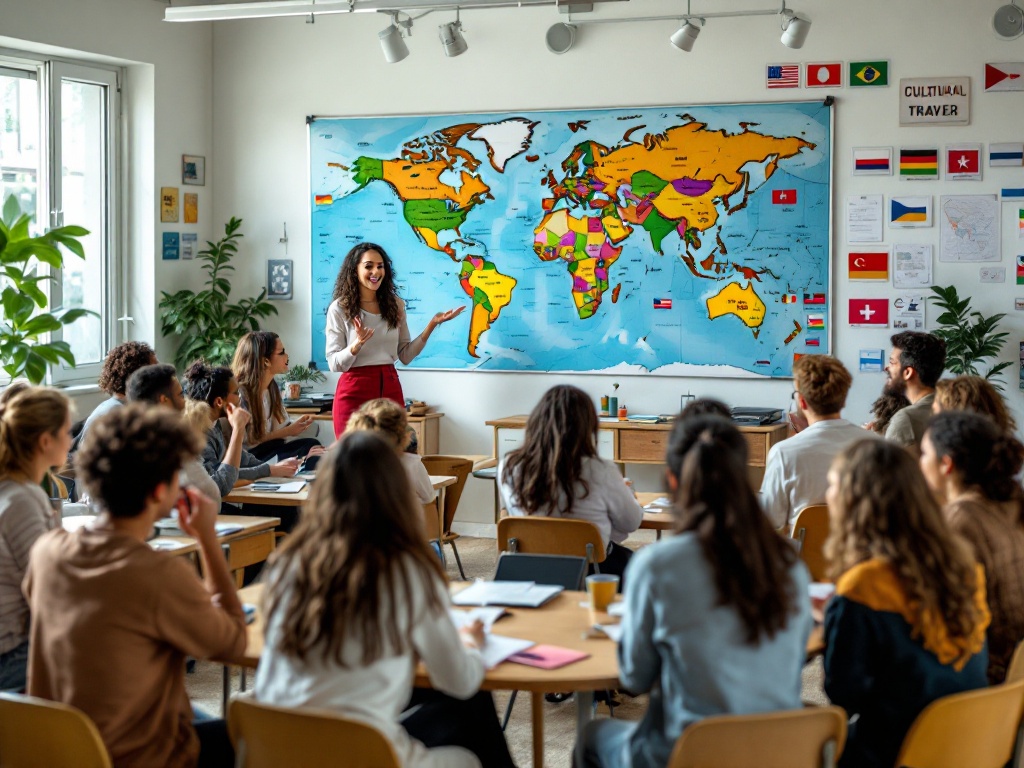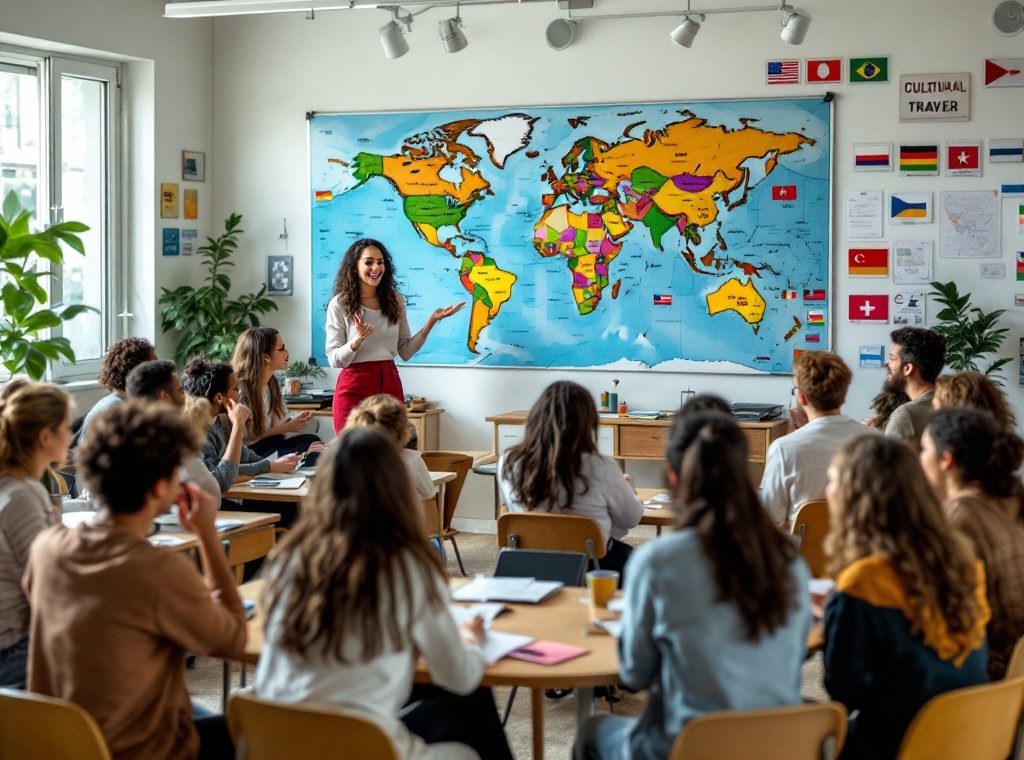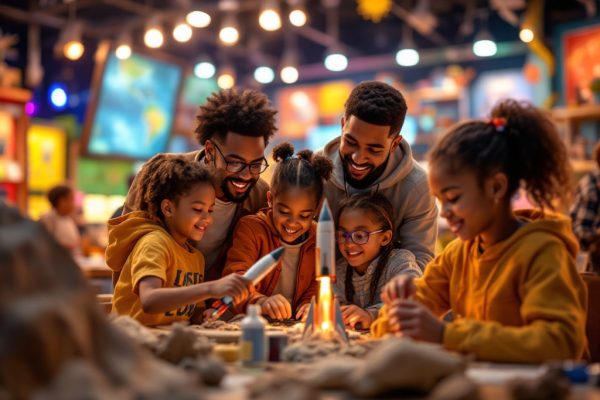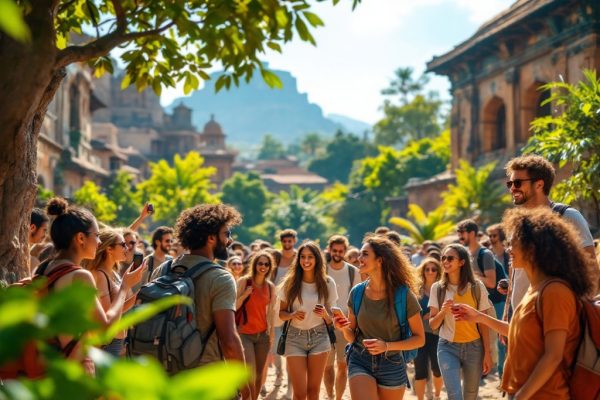How to Prepare Students for International Educational Travel
Transformative international educational travel experiences await! This comprehensive guide equips teachers with the essential tools to prepare students for a successful journey abroad. From pre-trip planning and cultural awareness workshops to health and safety protocols and financial management advice, discover how to empower students to embrace new cultures, build essential life skills, and gain unique educational experiences. Explore this invaluable resource and unlock the potential of international travel for your students.
Important information

- Research the destination: Learn about the culture, local laws, and safety concerns.
- Plan a detailed itinerary: Include travel logistics, accommodation, and planned activities.
- Address health and safety: Ensure students have required documents, vaccinations, and insurance. Discuss safety protocols and emergency procedures.
- Facilitate cultural sensitivity: Conduct pre-trip meetings to discuss intercultural communication and potential culture shock. Encourage learning basic local phrases.
- Provide financial and communication guidance: Offer advice on managing finances abroad and international communication options.
How to Prepare Students for International Educational Travel
Preparing students for international travel is a crucial role for teachers. Thorough research is essential, covering the destination’s cultural norms, local laws, and safety concerns. A detailed itinerary outlining travel logistics, accommodation, and planned activities is vital. Share emergency contact information with students and parents. Pre-trip meetings are important for discussing intercultural communication, respectful interactions, and cultural sensitivity. Addressing potential challenges like homesickness and culture shock helps students prepare emotionally. Students also need practical advice: ensure they have the correct travel documents, like passports and visas, and fulfill health requirements, including vaccinations and insurance. Introducing basic language skills and cultural practices enhances their experience. Finally, establish clear safety regulations and emergency protocols, and provide financial management guidelines. Communicate all this information effectively to both students and their families.
Conduct thorough research. Research the destination’s cultural norms, local laws, and safety concerns.
Create a detailed itinerary. Outline travel logistics, accommodation, and planned activities.
Share emergency contact information. Provide contact information to both students and parents.
Conduct pre-trip meetings. Discuss intercultural communication, respectful interactions, and cultural sensitivity. Address potential challenges like homesickness and culture shock.
Provide practical advice. Ensure students have the correct travel documents (passports and visas) and fulfill health requirements (vaccinations and insurance).
Introduce basic language skills and cultural practices. This will enhance their travel experience.
Establish clear safety regulations and emergency protocols. Provide financial management guidelines.
Communicate effectively. Share all information with both students and their families.
Research and Planning for International Travel
Planning an international trip as a student requires careful preparation. Before you go, research your destination’s customs, laws, and cultural norms. Create a detailed itinerary, including transportation and accommodation details. Familiarize yourself with safety protocols and emergency procedures. Secure necessary documents like your passport and visa. Research health requirements, such as vaccinations. Establish a solid financial plan with a realistic budget and accessible funds. Develop effective communication strategies and attend pre-trip meetings for a smooth and enriching journey.
Research your destination. Learn about the local customs, laws, and cultural norms to ensure a respectful and positive experience.
Plan your itinerary. Include transportation details, accommodation bookings, and planned activities.
Prioritize safety. Familiarize yourself with safety protocols, emergency procedures, and local contact information.
Secure necessary documents. Ensure your passport and visa are valid and up-to-date. Obtain any required travel documents or permits.
Check health requirements. Research recommended vaccinations and any specific health advisories for your destination.
Manage your finances. Create a realistic budget, ensure you have accessible funds, and consider travel insurance.
Communicate effectively. Establish communication strategies with family and friends back home. Attend pre-trip meetings for important information and guidance.
Conduct Thorough Research on the Destination
Planning your trip effectively can greatly enhance your travel experience. Before you go, take some time to learn about your destination’s local customs and cultural etiquette. Understanding these nuances will enrich your interactions and overall experience. Researching the laws and safety regulations of your destination is crucial for a smooth and trouble-free trip. Delve into the region’s history and geography to gain a deeper appreciation of the place you’re visiting. Planning your transportation options, understanding currency exchange procedures, and learning basic communication strategies will also prove invaluable during your travels. With a little preparation, your journey will be more enjoyable and hassle-free.
Understanding Travel Plans and Logistics
Familiarize yourself with your flight information, including departure and arrival times, layovers, and airport codes.
Understand your lodging type, check-in/check-out procedures, and available amenities.
Plan your in-country transportation, considering options like public transit, private cars, or organized tours. Learn about routes, schedules, and costs.
Intercultural Communication Preparation
Enhance your travel experience by attending a cultural awareness workshop before your trip abroad. These interactive sessions delve into the customs, traditions, and social etiquette of your destination. Engaging in role-playing exercises will equip you with practical skills to navigate intercultural scenarios and adopt appropriate behaviors. Open discussions provide a platform to address potential cultural misunderstandings and explore respectful solutions. Learning basic local phrases will not only enhance communication but also enrich your travel experience.
Essential Documentation and Health Requirements
Secure your passport and visa well in advance, as this can be a lengthy process.
Research required and recommended vaccinations and other health precautions early on.
Gather and properly document any necessary medications before your departure.
Securing Passports and Visas
International students need a valid passport with sufficient remaining validity. Depending on your citizenship and destination, you may also need a visa. Research visa requirements early and apply promptly through the appropriate embassy or consulate. Securing the correct visa prevents potential entry denials, ensuring a smooth trip.
Gathering Information about Health Requirements
Planning international travel, especially for students, requires careful preparation. Research your destination’s health guidelines, including required vaccinations. Consulting travel advisories from reputable sources like the CDC and WHO is crucial for safe and informed travel.
Carrying Necessary Medications
When traveling abroad, students should ensure their prescription medications are kept in their original containers to comply with regulations.
Language Skills and Cultural Adaptation
Learning a few local phrases can greatly enhance your travel experience. It enables you to connect with locals, order food easily, and navigate new streets with confidence. Even using public transport becomes simpler.
- Converse with residents.
- Order meals with ease.
- Navigate unfamiliar streets.
- Use public transportation more easily.
Understanding local customs is also essential. Researching traditions and etiquette beforehand helps avoid unintentional cultural misunderstandings. Showing cultural sensitivity demonstrates respect for your host country, leading to richer experiences and stronger bonds with the local culture. Pre-departure orientations are invaluable resources, covering these key elements of international travel.
- Research traditions and etiquette.
- Prevent cultural faux pas.
- Show respect for the host country.
- Have more enriching experiences.
- Build deeper connections with locals.
Learning Basic Phrases of the Local Language
Learning basic phrases can significantly enhance your travel experience. Mastering greetings, polite expressions, and simple directions allows you to connect with locals, demonstrating respect and boosting your own confidence. This also fosters cultural exchange, enriching your travels. Resources like language learning apps and phrasebooks are invaluable tools, especially for learning how to ask for assistance in unfamiliar situations.
Understanding Cultural Norms and Practices
Immerse yourself in the local culture before traveling. Pre-trip workshops and multimedia resources offer valuable insights into customs and cultural norms. Engage in discussions and role-playing to practice respectful interactions. Delve deeper with books and articles, or hear firsthand accounts from guest speakers. Understanding the destination’s history is crucial. Incorporate lessons on customs and social norms into your learning. Try cooking traditional dishes and learning basic local phrases for a more enriching experience. Cultural exchange is a continuous journey of learning and adapting.
Attend pre-trip workshops and explore multimedia resources to gain valuable insights into local customs and cultural norms.
Engage in discussions and role-playing activities to practice respectful interactions with people from different cultural backgrounds.
Deepen your understanding by reading books and articles, or listen to firsthand accounts from guest speakers who have experienced the local culture.
Learn about the destination’s history, including its customs and social norms, to gain a deeper appreciation for the culture.
Immerse yourself further by trying to cook traditional dishes and learning basic local phrases.
Embrace cultural exchange as a continuous journey of learning and adapting.
Safety Measures and Insurance
Traveling abroad as a student is an enriching experience, but it’s essential to be prepared for unexpected situations. Travel insurance offers crucial protection for your health and belongings while you’re away from home. Before embarking on your journey, take the time to research your destination. Learn about local laws and customs, and be aware of any potential safety concerns. Having a comprehensive emergency plan is also vital. This plan should include contact information for local authorities, your embassy or consulate, and your family back home. Consider what actions you would take in various scenarios, such as medical emergencies, lost documents, or natural disasters. By taking these precautionary steps, you can ensure a smoother and more secure experience during your studies abroad.
Acquiring Travel Insurance
Travel insurance is a vital safeguard for students studying abroad. It offers protection against unforeseen medical costs, trip cancellations, and lost luggage. Furthermore, it provides support during other travel emergencies, ensuring both financial security and peace of mind. International students should strongly consider obtaining this valuable protection.
Understanding Safety Regulations of the Destination
Before traveling, familiarize yourself with local laws and customs. Check with your embassy or consulate for the latest safety information and be sure to understand potential health risks, including recommended vaccinations and common illnesses. For your safety:
- travel in groups,
- stay aware of your surroundings,
- and know how to access local medical care.
Keep emergency contacts and your embassy’s information readily available.
Emergency Plan and Contact Protocol
Emergency Contact List
Compile a readily available emergency contact list including program leaders, local authorities, and family members. This ensures everyone’s safety during the trip.
Meeting Points and Communication
Establish clear meeting points and review communication protocols. This is crucial in case of separations or emergencies.
Safety Regulations Review
Discuss safety regulations at your destination, covering local laws, customs, and potential safety concerns. Being aware of these aspects will contribute to a safer trip.
Local Medical Care Access
Explain how to access local medical care. This is essential information for any traveler.
Personal Safety Tips
Share personal safety tips. Encourage students to stay aware of their surroundings and secure their belongings to enhance their safety.
Financial Management and Communication
Planning a trip abroad? Smart financial preparation and communication are key to a smooth and enjoyable experience.
Manage Your Finances
- Create a comprehensive budget. Factor in accommodation, meals, transport, activities, and souvenirs.
- Use prepaid travel cards or international debit cards. These offer secure access to your money and minimize the need for cash.
- Notify your bank of your travel dates. This will prevent any issues with your cards being blocked.
- Research currency exchange rates. Use reputable services for the best value.
Stay Connected
- Check your phone plan for international roaming charges. These can be surprisingly high.
- Consider an international roaming package or a local SIM card. A local SIM card can often be a more cost-effective option.
- Use Wi-Fi hotspots for communication and data. This will help you keep costs down.
- Download communication apps like WhatsApp or Skype. These apps offer affordable calls and messages.
Managing Finances and Accessing Funds Safely
Prepaid travel cards offer a secure way for students to manage their finances abroad, eliminating the need to carry large amounts of cash. They can easily access funds at ATMs, but it’s crucial to inform them about potential international transaction fees. For added safety, encourage students to divide their money between a secure location at their accommodation and a smaller amount for daily expenses. Educating them about potential scams and advising against carrying large sums of cash further minimizes their risk. This approach not only protects their money but also provides peace of mind during their travels.
Checking Phone Plans for International Use
Before venturing abroad, connect with your mobile provider to explore international roaming options and their associated costs. For longer trips, consider a local SIM card for potential cost savings, ensuring your phone is unlocked to accommodate it. Alternatively, explore communication apps like WhatsApp and Skype, leveraging Wi-Fi for calls and texts to potentially reduce expenses.
Pre-Trip Meetings and Community Building
Pre-trip meetings are crucial for students traveling abroad. They alleviate anxieties and cover essential topics like itineraries and safety protocols. These gatherings also foster a sense of community, building camaraderie and strengthening support networks for a smoother, more enjoyable trip.
Benefits of Pre-Trip Meetings
- Reduced anxiety, addressing concerns about the unknown.
- Comprehensive preparation, covering itineraries, safety, and cultural norms.
- Stronger community, fostering camaraderie and support networks.
Key Topics Discussed
- Cultural awareness training for respectful interactions in the host country.
- Practical information regarding currency exchange, communication, and local customs.
- Emergency procedures to ensure student safety and preparedness for unforeseen events.
Address anxieties. Discuss potential concerns and provide solutions, creating a comfortable environment for students to voice their questions.
Cover essential topics. Review itineraries, safety protocols, and cultural norms, ensuring students are well-prepared for their international experience.
Foster a sense of community. Encourage interaction among students to build camaraderie and strengthen support networks before departure.
Pre-trip meetings are essential for a positive overseas experience. They instill confidence and excitement, setting the stage for a successful and enriching educational journey.
Participating in Pre-Trip Meetings
Pre-trip meetings are crucial for students, offering a comprehensive overview of the itinerary, cultural nuances, and essential health and safety information. These gatherings provide a platform for students to address concerns and prepare emotionally and mentally for their journey. Discussions cover trip expectations, fostering a sense of community and shared purpose. For example, the meetings introduce basic local language and customs, preparing students for potential cultural differences.
Itinerary Overview. The meetings provide a detailed itinerary, outlining the planned activities, destinations, and travel arrangements.
Cultural Nuances. Discussions cover local customs, traditions, and etiquette, helping students navigate cultural differences respectfully.
Health and Safety Information. Essential health and safety guidelines are reviewed, including necessary vaccinations, travel insurance, and emergency procedures.
Open Forum for Concerns. Students have the opportunity to voice any concerns or anxieties they may have about the trip.
Emotional and Mental Preparation. The meetings help students prepare emotionally and mentally for the challenges and excitement of traveling abroad.
Creating a Positive Community Among Students
Pre-trip meetings are crucial for fostering a strong student community. These gatherings allow students to connect beforehand, discuss expectations, and collaborate on planning. This creates a supportive atmosphere that reduces travel anxiety and enhances the overall trip experience. A strong sense of community also promotes teamwork and enriches shared experiences abroad, ultimately making the journey more enjoyable for all.
Developing Life Skills and Personal Growth
International travel cultivates essential skills like adaptability and resilience, empowering students to navigate unfamiliar environments and conquer challenges. They learn problem-solving and adaptability, boosting their confidence in unexpected situations. Furthermore, encountering diverse cultures, situations, and occasional setbacks fosters resilience.
Unique Educational Experiences
Beyond the classroom, unique educational experiences enrich learning. Immersing students in different cultures, histories, and environments provides firsthand exposure to diverse perspectives, broadening their global understanding. These experiences enhance academic learning and inspire personal growth.
- Visiting historical sites brings history to life.
- Exploring different political systems deepens social studies knowledge.
- Immersion fosters a profound appreciation for language and culture.
Pre-Departure Preparation and Support
Effective pre-departure preparation and support are crucial. Teachers can facilitate pre-trip meetings to discuss expectations and address student concerns. Providing resources on the destination’s culture, customs, and language is essential, as is maintaining open communication throughout the trip to ensure students feel supported.
Step 1: Research Your Destination
Thoroughly research your destination, including local customs and laws.
Step 2: Pack Appropriately
Pack appropriately for the climate and planned activities.
Step 3: Secure Necessary Documents
Secure necessary documents such as passports and visas.
Step 4: Be Open-Minded and Respectful
Maintain open-mindedness, respect for local cultures.
Step 5: Minimize Environmental Impact
Minimize your environmental impact by making sustainable choices.
Building Adaptability and Resilience
Adaptability empowers students to navigate unfamiliar situations and cultures with greater ease. Resilience enables them to overcome challenges and bounce back from setbacks. These essential skills are crucial for successful international travel, allowing students to manage unforeseen circumstances. Research shows that students with these qualities excel academically and experience enhanced overall well-being.
Gaining Unique Educational Experiences
International travel significantly enhances education by offering experiences beyond the classroom. Students develop adaptability and resilience as they navigate unfamiliar cultures and environments, fostering personal growth. For instance, students of ancient Roman history can experience the Colosseum and Roman Forum firsthand, bringing their studies to life. These immersive experiences provide deeper insights, create lasting memories, and inspire lifelong learning. Such opportunities broaden perspectives, foster critical thinking, and promote intercultural understanding. Whether visiting historical sites, engaging with local communities, or participating in service-learning projects, students gain invaluable personal growth experiences. Experiencing different cultures firsthand allows students to challenge their assumptions, develop empathy, and appreciate diverse perspectives. This broadened worldview is essential for success in an increasingly interconnected world.
Advice for Teachers on Student Preparation
Preparing students for international travel involves combining practical planning with cultural awareness. Start with informational meetings covering itineraries, required documents, and health precautions such as vaccinations and travel insurance. Provide helpful packing tips tailored to the destination’s climate and culture. Discussing local customs and etiquette demonstrates respect and prepares students for a more immersive experience. Pre-travel workshops on cultural sensitivity further enhance this understanding by exploring local traditions and social norms. Encouraging even basic language acquisition can significantly enrich the travel experience. Finally, establish clear communication protocols for safety and peace of mind throughout the trip.
Hold informational meetings covering itineraries, required documents (like visas and passports), and health precautions, including vaccinations and travel insurance.
Share helpful packing tips specific to the destination’s climate and cultural norms.
Discuss local customs and etiquette to foster respect and prepare students for a more immersive experience.
Conduct pre-travel workshops focusing on cultural sensitivity. Explore local traditions, social norms, and potential cultural differences.
Encourage basic language acquisition. Even a few basic phrases can greatly enhance the travel experience.
Establish clear communication protocols. This is essential for both safety and peace of mind during the trip.
Guidelines for Students Planning a Trip Abroad
Planning your trip effectively involves several key steps.
Research your destination thoroughly, including local customs, laws, and cultural norms. Familiarize yourself with the local currency and exchange rates.
Ensure your passport’s validity and obtain necessary visas. Take care of required vaccinations and understand potential health risks. Travel insurance is crucial; it should cover medical emergencies and other unforeseen issues.
Pack suitable clothing and personal items. Share your itinerary with loved ones and stay in touch. Carry emergency contact information and safeguard important documents. Be mindful of your surroundings and take necessary safety precautions.
Learning basic local phrases can enhance communication. Embrace and respect cultural differences. Manage your finances wisely and access your money securely. Check your phone plan for international use to avoid unexpected data roaming charges.
Pre-trip meetings offer valuable information and guidance. Contribute to a positive travel community and embrace opportunities for personal growth. Be open to new experiences, adapt to unfamiliar situations, and reflect on your journey to appreciate its educational value.













